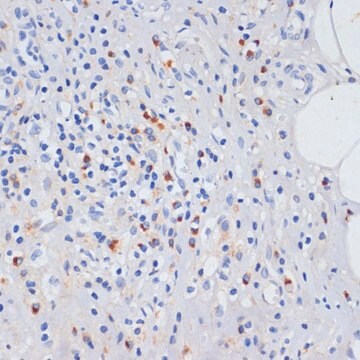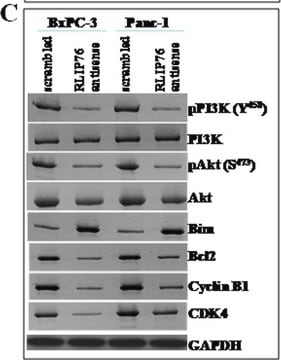CBL208
Anti-Cytokeratin 20 Antibody, clone IT-Ks20.8
clone IT-Ks20.8, Chemicon®, from mouse
About This Item
Recommended Products
biological source
mouse
Quality Level
antibody form
purified immunoglobulin
antibody product type
primary antibodies
clone
IT-Ks20.8, monoclonal
species reactivity
human
should not react with
mouse, rat
manufacturer/tradename
Chemicon®
technique(s)
immunohistochemistry: suitable (paraffin)
western blot: suitable
isotype
IgG2a
NCBI accession no.
UniProt accession no.
shipped in
wet ice
Gene Information
human ... KRT20(54474)
mouse ... Krt20(66809)
rat ... Krt20(286912)
General description
Specificity
Immunogen
Application
Immunohistochemistry: 1:10 dilution of stock on frozen tissues, with one hour incubation at room temp or overnight at 2°-8°C. For paraffin sections, 1:100 dilution of antibody with protease pretreatment and/or heat induced epitope retrieval recommended.
Cytological material
Studies of cultured cell lines HT-29, LoVo, DLD-1, SW1116, CaCo-2 & RT-4.
Optimal working dilutions must be determined by the end user.
Cell Structure
Cytokeratins
Linkage
Physical form
Storage and Stability
Analysis Note
Positive cell lines include HT-29, LoVo, DLD-1, SW 1116, CaCo-2 and RT-4.
Legal Information
Disclaimer
Not finding the right product?
Try our Product Selector Tool.
Signal Word
Warning
Hazard Statements
Precautionary Statements
Hazard Classifications
Acute Tox. 4 Dermal - Acute Tox. 4 Inhalation - Aquatic Chronic 3
Storage Class Code
11 - Combustible Solids
WGK
WGK 3
Certificates of Analysis (COA)
Search for Certificates of Analysis (COA) by entering the products Lot/Batch Number. Lot and Batch Numbers can be found on a product’s label following the words ‘Lot’ or ‘Batch’.
Already Own This Product?
Find documentation for the products that you have recently purchased in the Document Library.
Our team of scientists has experience in all areas of research including Life Science, Material Science, Chemical Synthesis, Chromatography, Analytical and many others.
Contact Technical Service









